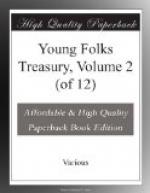“That know I right well,” replied Ganelon, “therefore have I named thee.”
Then to Charlemagne Roland turned, “Give me the bow of office, Sire, and let me take command,” he said.
But the Emperor sat with bowed head. In and out of his long white beard he twisted his fingers. Tears stood in his eyes, and he kept silence. Such was his love for Roland and fear lest evil should befall him.
Then spoke Duke Naimes, “Give the command unto Roland, Sire; there is none better.”
So, silently, Charlemagne held out the bow of office, and kneeling, Roland took it.
Then was Ganelon’s wicked heart glad.
“Nephew,” said Charlemagne, “half my host I leave with thee.”
“Nay, Sire,” answered Roland proudly, “twenty thousand only shall remain with me. The rest of ye may pass onward in all surety, for while I live ye have naught to fear.”
Then in his heart Ganelon laughed.
So the mighty army passed onward through the vale of Roncesvalles without doubt or dread, for did not Roland the brave guard the rear? With him remained Oliver his friend, Turpin, the bold Archbishop of Rheims, all the peers, and twenty thousand more of the bravest knights of France.
As the great army wound along, the hearts of the men were glad. For seven long years they had been far from home, and now soon they would see their dear ones again. But the Emperor rode among them sadly with bowed head. His fingers again twined themselves in his long white beard, tears once more stood in his eyes. Beside him rode Duke Naimes. “Tell me, Sire,” he said, “what grief oppresseth thee?”
“Alas,” said Charlemagne, “by Ganelon France is betrayed. This night I dreamed I saw him break my lance in twain. And this same Ganelon it is that puts my nephew in the rear-guard. And I, I have left him in a strange land. If he die, where shall I find such another?”
It was in vain that Duke Naimes tried to comfort the Emperor. He would not be comforted, and all the hearts of that great company were filled with fearful, boding dread for Roland.
III
ROLAND’S PRIDE
Meanwhile King Marsil was gathering all his host. From far and near came the heathen knights, all impatient to fight, each one eager to have the honor of slaying Roland with his own hand, each swearing that none of the twelve peers should ever again see France.
Among them was a great champion called Chernuble. He was huge and ugly and his strength was such that he could lift with ease a burden which four mules could scarcely carry. His face was inky black, his lips thick and hideous, and his coarse long hair reached the ground. It was said that in the land from whence he came, the sun never shone, the rain never fell, and the very stones were black as coal. He too, swearing that the Franks should die and that France should perish, joined the heathen host.




